Esoteric Christianity, or The Lesser Mysteries - Annie Besant (ebook reader that looks like a book .TXT) 📗
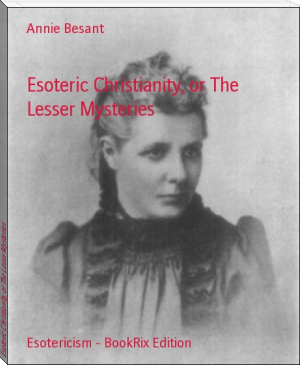
- Author: Annie Besant
Book online «Esoteric Christianity, or The Lesser Mysteries - Annie Besant (ebook reader that looks like a book .TXT) 📗». Author Annie Besant
Thus in every Christ that rises, all humanity is lifted a step higher, and by His wisdom the ignorance of the whole world is lessened. Each man is less weak because of His strength, which pours out over all humanity and enters the separated soul. Out of that doctrine, seen narrowly, and therefore mis-seen, grew the idea of the vicarious Atonement as a legal transaction between God and man, in which Jesus took the place of the sinner. It was not understood that One who had touched that height was verily one with all His brethren; identity of nature was mistaken for a personal substitution, and thus the spiritual truth was lost in the harshness of a judicial exchange.
"Then he comes to a knowledge of his place in the world, of his function in nature--to be a Saviour and to make atonement for the sins of the people. He stands in the inner Heart of the world, the Holy of Holies, as a High Priest of Humanity. He is one with all his brethren, not by a vicarious substitution, but by the unity of a common life. Is any sinful? he is sinful in them, that his purity may purge them. Is any sorrowful? in them he is the man of sorrows; every broken heart breaks his, in every pierced heart his heart is pierced. Is any glad? in them he is joyous, and pours out his bliss. Is any craving? in them he is feeling want that he may fill them with his utter satisfaction. He has everything, and because it is his it is theirs. He is perfect; then they are perfect with him. He is strong; who then can be weak, since he is in them? He climbed to his high place that he might pour out to all below him, and he lives in order that all may share his life. He lifts the whole world with him as he rises, the path is easier for all men, because he has trodden it.
"Every son of man may become such a manifested Son of God, such a Saviour of the world. In each such Son is 'God manifest in the flesh,'[236] the atonement that aids all mankind, the living power that makes all things new. Only one thing is needed to bring that power into manifested activity in any individual soul; the soul must open the door and let Him in. Even He, all-permeating, cannot force His way against His brother's will; the human will can hold its own alike against God and man, and by the law of evolution it must voluntarily associate itself with divine action, and not be broken into sullen submission. Let the will throw open the door, and the life will flood the soul. While the door is closed it will only gently breathe through it its unutterable fragrance, that the sweetness of that fragrance may win, where the barrier may not be forced by strength.
"This it is, in part, to be a Christ; but how can mortal pen mirror the immortal, or mortal words tell of that which is beyond the power of speech? Tongue may not utter, the unillumined mind may not grasp, that mystery of the Son who has become one with the Father, carrying in His bosom the sons of men."[237]
Those who would prepare to rise to such a life in the future must begin even now to tread in the lower life the path of the Shadow of the Cross. Nor should they doubt their power to rise, for to do so is to doubt the God within them. "Have faith in yourself," is one of the lessons that comes from the higher view of man, for that faith is really in the God within. There is a way by which the shadow of the Christ-life may fall on the common life of man, and that is by doing every act as a sacrifice, not for what it will bring to the doer but for what it will bring to others, and, in the daily common life of small duties, petty actions, narrow interests, by changing the motive and thus changing all. Not one thing in the outer life need necessarily be varied; in any life sacrifice may be offered, amid any surroundings God may be served. Evolving spirituality is marked not by what a man does, but by how he does it; not in the circumstances, but in the attitude of a man towards them, lies the opportunity of growth. "And indeed this symbol of the cross may be to us as a touchstone to distinguish the good from the evil in many of the difficulties of life. 'Only those actions through which shines the light of the cross are worthy of the life of the disciple,' says one of the verses in a book of occult maxims; and it is interpreted to mean that all that the aspirant does should be prompted by the fervour of self-sacrificing love. The same thought appears in a later verse: 'When one enters the path, he lays his heart upon the cross; when the cross and the heart have become one, then hath he reached the goal.' So, perchance, we may measure our progress by watching whether selfishness or self-sacrifice is dominant in our lives."[238]
Every life which begins thus to shape itself is preparing the cave in which the Child-Christ shall be born, and the life shall become a constant at-one-ment, bringing the divine more and more into the human. Every such life shall grow into the life of a "beloved Son," and shall have in it the glory of the Christ. Every man may work in that direction by making every act and power a sacrifice, until the gold is purged from the dross, and only the pure ore remains.
CHAPTER VIII.
RESURRECTION AND ASCENSION
The doctrines of the Resurrection and Ascension of Christ also form part of the Lesser Mysteries, being integral portions of "The Solar Myth," and of the life-story of the Christ in man.
As regards Christ Himself they have their historical basis in the facts of His continuing to teach His apostles after His physical death, and of His appearance in the Greater Mysteries as Hierophant after His direct instructions had ceased, until Jesus took His place. In the mythic tales the resurrection of the hero and his glorification invariably formed the conclusion of his death-story; and in the Mysteries, the body of the candidate was always thrown into a death-like trance, during which he, as a liberated soul, travelled through the invisible world, returning and reviving the body after three days. And in the life-story of the individual, who is becoming a Christ, we shall find, as we study it, that the dramas of the Resurrection and Ascension are repeated.
But before we can intelligently follow that story, we must master the outlines of the human constitution, and understand the natural and spiritual bodies of man. "There is a natural body, and there is a spiritual body."[239]
There are still some uninstructed people who regard man as a mere duality, made up of "soul" and "body." Such people use the words "soul" and "spirit" as synonyms, and speak indifferently of "soul and body" or "spirit and body," meaning that man is composed of two constituents, one of which perishes at death, while the other survives. For the very simple and ignorant this rough division is sufficient, but it will not enable us to understand the mysteries of the Resurrection and Ascension.
Every Christian who has made even a superficial study of the human constitution recognises in it three distinct constituents--Spirit, Soul, and Body. This division is sound, though needing further subdivision for more profound study, and it has been used by S. Paul in his prayer that "your whole spirit and soul and body be preserved blameless."[240] That threefold division is accepted in Christian Theology.
The Spirit itself is really a Trinity, the reflexion and image of the Supreme Trinity, and this we shall study in the following chapter.[241] The true man, the immortal, who is the Spirit, is the Trinity in man. This is life, consciousness, and to this the spiritual body belongs, each aspect of the Trinity having its own Body. The Soul is dual, and comprises the mind and the emotional nature, with its appropriate garments. And the Body is the material instrument of Spirit and Soul. In one Christian view of man he is a twelve-fold being, six modifications forming the spiritual man, and six the natural man; according to another, he is divisible into fourteen, seven modifications of consciousness and seven corresponding types of form. This latter view is practically identical with that studied by Mystics, and it is usually spoken of as seven-fold, because there are really seven divisions, each being two-fold, having a life-side and a form-side.
These divisions and sub-divisions are somewhat confusing and perplexing to the dull, and hence Origen and Clement, as we have seen,[242] laid great stress on the need for intelligence on the part of all who desired to become Gnostics. After all, those who find them troublesome can leave them on one side, without grudging them to the earnest student, who finds them not only illuminative, but absolutely necessary to any clear understanding of the Mysteries of Life and Man.
The word Body means a vehicle of consciousness, or an instrument of consciousness; that in which consciousness is carried about, as in a vehicle, or which consciousness uses to contact the external world, as a mechanic uses an instrument. Or, we may liken it to a vessel, in which consciousness is held, as a jar holds liquid. It is a form used by a life, and we know nothing of consciousness save as connected with such forms. The form may be of rarest, subtlest, materials, may be so diaphanous that we are only conscious of the indwelling life; still it is there, and it is composed of Matter. It may be so dense, that it hides the indwelling life, and we are conscious only of the form; still the life is there, and it is composed of the opposite of Matter--Spirit. The student must study and re-study this fundamental fact--the duality of all manifested existence, the inseparable co-existence of Spirit and Matter in a grain of dust, in the Logos, the God manifested. The idea must become part of him; else must he give up the study of the Lesser Mysteries. The Christ, as God and Man, only shows out on the kosmic scale the same fact of duality that is repeated everywhere in nature. On that original duality everything in the universe is formed.
Man has a "natural body," and this is made up of four different and separable portions, and is subject to death.
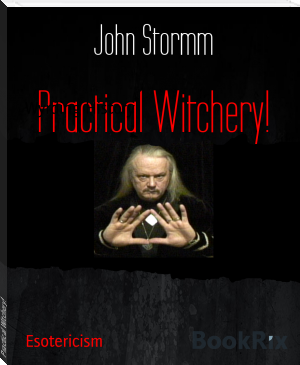

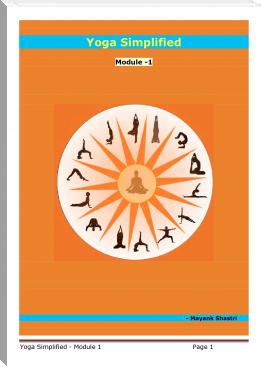
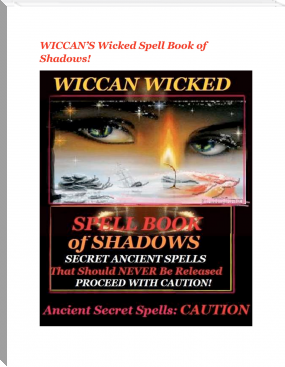
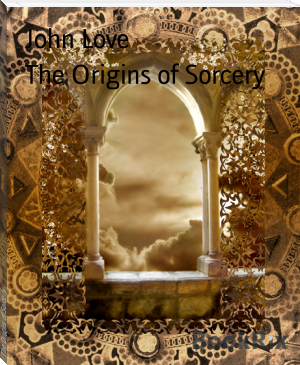
Comments (0)